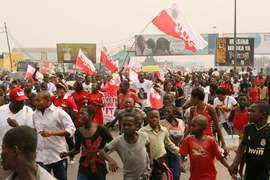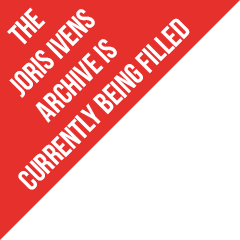
Filmstill uit Ataluku van Dieudo Hamadi, 2013
Hoe wordt je documentaire filmmaker in een land zonder film? Afgelopen zaterdag kreeg de jonge Congolese filmmaker Dieudo Hamadi de Joris Ivens Prijs uitgereikt voor zijn documentaire Atalaku (2013). De Joris Ivens Prijs wordt jaarlijks door het documentaire festival ‘Cinéma du réel’ in Centre Pompidou uitgeloofd voor de eerste of tweede film van een filmmaker. Hamadi kreeg in Kinshasa, een stad met negen miljoen inwoners zonder film en weinig DVD’s, de beschikking over een DV-camera, waarmee hij de verkiezingscampagne van 2011 vastlegde. Het was pas de tweede democratische verkiezing in Congo. Hij volgde speciaal de ‘atalaku’s’, arme bewoners die stemmen werven door teksten om te roepen voor de hoogste bieder onder de presidentskandidaten, waarvan ze vaak de namen niet eens kennen. Hamadi zit met zijn camera dicht bovenop de campagne van één van hen.
Lees hier een interview met Diedo Hamadi www.telerama.fr/cinema/dieudo-hamadi-realisateur-congolais-le-documentaire-est-la-forme-la-plus-compatible-avec-mon-environnement,95386.php
Voor meer over het 35e Festival Cinéma du réel: www.cinemadureel.org/en
ATALAKU
Dieudo Hamadi
2013 / France, Congo, Democratic Republic of the / 60 min
The 2011 presidential election is only the second free election since the Democratic Republic of the Congo gained independence in 1960. Gaylor, a penniless (like most of Kinshasa’s nine million inhabitants) pastor turns into an atalaku, which means a “crier” in Lingala. He makes a deal with the political candidate who has offered him the highest price for his services: ensuring the campaign’s street publicity and finding musicians to write the campaign’s song. Atalaku could certainly not have been made by a non-Congolese, given the extent to which the filmmaker becomes one with those he films – he is sometimes summoned to film ballot-box stuffing and the teeming crowd make way for him, dimly aware that having a witness is crucial. The film is constructed so as to show the domino effect between the atalaku and those he pays down the line – musicians, salespeople, dancers – to a point of confusion as Gaylor, who preaches for a very ephemeral god, is blamed for his inability to keep the promises of others. Hamadi’s choice to continue filming two weeks after the election alllowed him to accommodate an epilogue that breaks with this occasionally violent immersion, which also gives the film its force. (Charlotte Garson)
<<


